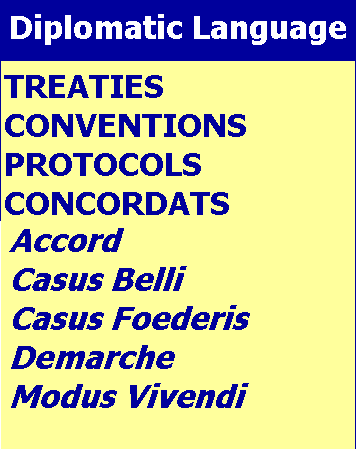
TREATY
CONVENTION
PROTOCOL
CONCORDAT

ACCORD
casus belli
casus foederis
demarche
modus vivendi
What is an Accord? |
We've all heard of accords. They're more like agreements, and, in fact, can be quite self-evident in understanding
what it is. Whether you are a franco- or anglophone, you do not really have to worry about this word. After all,Je suis d'accord
is one of the most used phrases in the French language; for an English-speaking, it's cinch. Or, is it?
According to Nicolson, accords are "matters of general international concern which are not of sufficient importance to justify
a formal treaty or convention are frequently arranged by means of an
"accord" or "agreement."
Can we thus surmise that accords are inconsequential with respect to diplomacy? Not quite. The most important thing to remember about them is
that they are not as important as a treaty (c.f. Treaty of Versailles where several territorial concessions were made, or Locarno treaties of 1925), because
they do not provide sufficient room for concessions owing to their tenuous nature.
We only have to think of the Irish Peace Accords, or better known as the Good Friday Agreement, where nothing substantial has been signed per se, but
talks between Ulster Unionists, Sinn Fein and the British govt -- headed by PM Tony Blair and spearheaded by Mo Mowlam, Northern Ireland Secretary -- have taken
place, and are taking place despite the current political permafrost. The reason why this is is that arms have yet to be decommisioned, etc. Just one of the tortuous
problems inherent in the Irish Question.
In short, you only have to look at the above to realize that an accord is no way tantamount to a treaty.